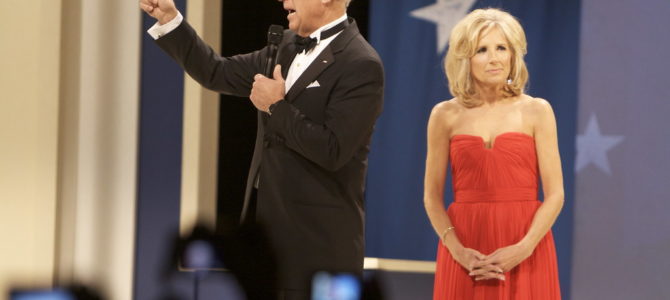
Joe Biden’s habit of affectionately touching and kissing women in professional settings is well-established. He can’t deny it and shouldn’t try, given that he’s long behaved this way in full public view, which also suggests he’s never really believed the behavior to be wrong.
Is it? And if it’s wrong, is it also disqualifying? For all the outrage and the memeing, these are the relevant questions, and they’re absolutely different. As much as I’d like to mock Biden, who seems poised to jump into the Democratic Party’s presidential primary, I don’t want to perpetuate the notion that what he did was either wrong or disqualifying if it wasn’t. Standards are important, and influence the precedents we set. (Democrats might be remembering an ousted senator by the name of Al Franken right about now.)
To the question of whether it’s wrong, one of Biden’s most memorable “victims” doesn’t believe it was. Images of the former vice president’s touchy behavior with Stephanie Carter while her husband was sworn in as defense secretary in 2015 went viral at the time, seeming to perfectly encapsulate the dynamics between creepy men and the uncomfortable female subjects of their misplaced intimacy. But Carter disagrees with that narrative entirely.
In a new Medium essay titled “The Me Too Story That Wasn’t Me,” Carter wrote, “The Joe Biden in my picture is a close friend helping someone get through a big day, for which I will always be grateful.” The implication is that Biden’s gesture was actually comforting to Carter, which is basically the opposite of our public interpretation, and serves as a good lesson in drawing snap judgments from pictures. “Wrong,” then, is not an apt description for his behavior in at least one of the most high-profile examples of it. (Sen. Chris Coons, D-Del., has provided another such example on behalf of his young daughter.)
Carter does not speak for everybody. Lucy Flores, the woman whose allegation that Biden smelled her hair and kissed the back of her head at a campaign event in 2014 precipitated this round of debate, said she didn’t believe he had “a bad intention.”
“I’m not in any way suggesting that I felt sexually assaulted or sexually harassed. I felt invaded. I felt there was a violation of my personal space,” Flores told MSNBC. “And it’s been dismissed as if it’s just Biden being Biden. Boys will be boys. No big deal. It is a big deal.”
Flores is asserting behavior that falls short of sexual assault and harassment can still constitute a “big deal,” which also remains a completely subjective measurement. Either way, it gets more to the question of whether Biden’s conduct is disqualifying than whether it’s wrong, as Flores certainly believes it to be.
I imagine there’s a mixture of women like Carter and Flores among the people Biden has touched in this way, some for whom it was fine and others for whom it was uncomfortable, even deeply so. In that sense, I think it’s fair to deem the behavior wrong, because his decision to act this way is predicated on an assumption that it’s okay, which was true of Carter but not of Flores.
I don’t know how many women fall into either of their categories, but I think it’s fair to say men should not assume women in professional environments are okay being kissed or having their shoulders rubbed or touching noses. That’s a reasonable sentiment, and one likely shared by a significant portion of women (myself included). Thus, it’s wrong to act on an assumption an individual woman is okay with it, because the odds she won’t be are high.
But is it disqualifying? The point Flores raised about Biden’s intentions is relevant here. I’m still of the persuasion that character counts in presidential candidates. On its own, an ignorance of personal boundaries, even if rooted in a deeper sense of entitlement or arrogance, is not a fatal character flaw. It could certainly be indicative of one, but that’s another matter to prove entirely. That is to say, Biden’s personal character is perfectly fair game for debate, but this alone isn’t enough to undercut his fitness for office.
All this is worth working through for two reasons: In this frenzied media environment, it’s (1) easy conflate bad behavior with disqualifying behavior, and (2) easy to join partisan pile-ons that contribute to the creation of incorrect standards. Both the question of whether Biden’s behavior is wrong and the question of whether it’s disqualifying provoke reasonably fair debates, but to argue those questions are necessarily the same is not correct.









